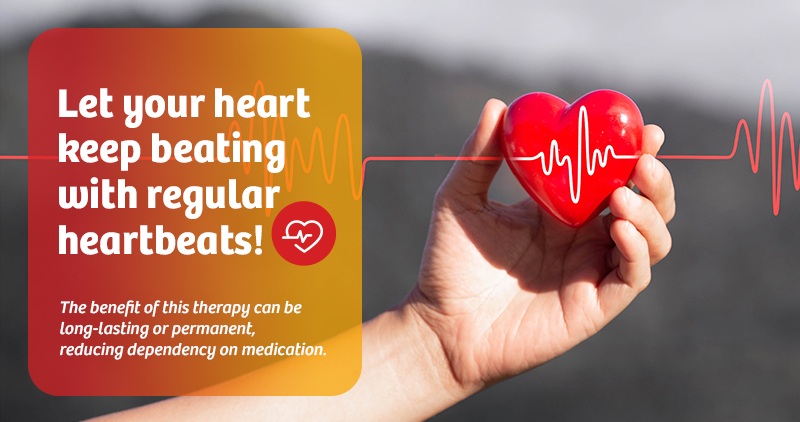What is heart arrhythmia?
Heart arrhythmia, also known as irregular heartbeat, is a condition where the electrical impulses that control the heart's rhythm are disrupted. It can cause the heart to beat too fast, too slow, or in an irregular pattern. While some arrhythmias are harmless, others can be serious and even life-threatening. Understanding this condition is crucial, as early detection and treatment can improve outcomes.
Types of heart arrhythmias :
- Atrial fibrillation (AFib):
AFib is one of the most common arrhythmias and occurs when the heart's upper chambers (the atria) beat irregularly and often too fast. It can lead to blood clots, stroke, and heart failure if left untreated.
- Ventricular fibrillation (VFib):
It is a life-threatening arrhythmia where the heart's lower chambers (the ventricles) quiver instead of pumping blood effectively. VFib often leads to cardiac arrest and requires immediate medical intervention.
- Bradycardia:
Bradycardia is when the heart beats too slowly, usually less than 60 beats per minute. It can cause dizziness, fatigue, and fainting. If the heart doesn't pump enough blood to the body, it can lead to severe complications.
- Tachycardia:
Tachycardia is a heart rate faster than usual—generally above 100 beats per minute. It can occur in the atria (supraventricular tachycardia) or the ventricles (ventricular tachycardia). Some types of tachycardia may be harmless, but others can be dangerous and lead to stroke or heart failure.
- Premature heartbeats:
These are early heartbeats that disrupt the normal rhythm. Though usually benign, frequent premature beats can indicate an underlying heart condition or lead to more severe arrhythmias.
Causes of arrhythmia :
Arrhythmias can develop due to several factors, including:
- Heart disease: Conditions such as coronary artery disease, heart failure, and valve problems can trigger arrhythmias.
- High blood pressure (Hypertension): Chronic hypertension can damage the heart and lead to arrhythmias.
- Electrolyte imbalances: Imbalances in sodium, potassium, and calcium levels can disrupt the electrical impulses in the heart.
- Lifestyle factors: Excessive alcohol consumption, smoking, drug abuse, and stress can contribute to arrhythmia development.
- Genetics: Some people inherit conditions that increase the likelihood of arrhythmias, such as Long QT syndrome.
- Age: The risk of arrhythmia increases as you age, especially if you have a history of heart disease or hypertension.
Symptoms of arrhythmia
Not all arrhythmias cause noticeable symptoms, but when they do, they may include:
- Palpitations (a sensation of a racing or irregular heartbeat)
- Dizziness or lightheadedness
- Shortness of breath
- Chest pain or discomfort
- Fatigue or weakness
- Fainting or near fainting
- Survival from cardiac arrest or family history of cardiac arrest.
It's essential to seek medical attention if you experience any of these symptoms, especially if they persist or worsen over time.
Treatment options for arrhythmia:
The treatment for arrhythmia depends on its type, severity, and underlying causes. Some standard options include:
Lifestyle changes:
There are several approaches to treating overactive bladder, including:
- Diet: A heart-healthy diet rich in fruits, vegetables, whole grains, and lean proteins can improve heart health.
- Exercise: Regular physical activity can help maintain a healthy heart and prevent arrhythmias triggered by stress or obesity.
- Limiting alcohol and caffeine: Reducing the intake of substances that alter the heart's rhythm can reduce the risk of arrhythmias.
Medications:
- Antiarrhythmic drugs: They help to regulate the heart's rhythm and/or reduce the rate.
- Beta-blockers or calcium channel blockers slow the heart rate and help reduce symptoms in conditions like tachycardia or AFib.
- Blood thinners: For conditions like AFib, blood thinners can prevent blood clots, reducing the risk of stroke.
Cardioversion:
This procedure restores a normal heart rhythm using electrical shocks. It's typically used in cases of AFib or certain types of tachycardia. Because the effect of this therapy option can be transient, it is reserved for the selected candidates.
Catheter ablation:
This minimally invasive procedure involves threading a catheter through blood vessels to the heart. It can destroy (ablate) small tissue areas, causing the arrhythmia.
The benefit of this therapy can be long-lasting or permanent, reducing dependency on medication. Beyond that, it has proven efficacy in prolonging survival and quality of life in selected groups of patients by reducing recurrence.
Cardiac implantable electronic devices:
- Pacemaker or implantable cardioverter defibrillator (ICD):
A pacemaker helps regulate slow heart rhythms, while an ICD can detect life-threatening arrhythmias and deliver shocks to restore a normal rhythm.
- Cardiac resynchronization Therapy (CRT):
A type of pacemaker with two electric cables stimulates the heart from both sides to improve its pumping function. This can improve the quality of life and life span of the selected individuals.
- Conduction system pacing:
A novel type of pacemaker therapy stimulates the heart through the natural conduction system. This is proven to reduce pacemaker-related rare side effects and has emerged as an alternative to CRT in selected patients.
Surgery:
In some cases, surgical intervention may be necessary to correct heart valve problems or other underlying structural issues contributing to arrhythmia.
In a nutshell :
Heart arrhythmias can range from mild to life-threatening, but with modern medicine, they can be effectively manageable. If you experience any symptoms or have a family history of heart disease, it's crucial to see a healthcare professional for early diagnosis and treatment. Managing the condition through lifestyle changes, medication, and medical procedures can help prevent complications and maintain a healthy, active life. It is never too late to make heart-healthy changes—take action today and invest in a healthier future with KD Hospital, where we have a multi-faced approach to treatment. Our team of expert cardiologists, surgeons and supportive care specialists collaborate to create a personalized treatment plan for patients' health needs. With advanced technology, surgical techniques, and compassionate patient-centred care, KD Hospital provides the best possible treatment related to cardiac care.

